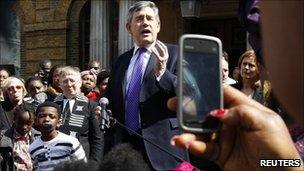Gordon Brown allegations: What is blagging?
- Published

Gordon Brown has accused News International of using "disgusting" methods to get stories
The practice of "blagging" has been thrust into the spotlight after allegations that a newspaper targeted the personal information of former Prime Minister Gordon Brown when he was Chancellor.
Evidence suggests it was used by the Sunday Times to obtain Mr Brown's private financial and property details.
The paper says it "pursued the story in the public interest" and "followed the PCC [Press Complaints Commission] Code on using subterfuge".
The Sunday Times adds "no law was broken in the process of this investigation".
But what is blagging? And can it ever be justified?
"Knowingly or recklessly obtaining or disclosing personal data or information without the consent of the data controller," is how it is defined under the Data Protection Act 1998, external.
Blagging addresses, phone bills, bank statements and health records has been illegal since 1994.
However, the Data Protection Act also offers a defence, which is available to anyone who shows that obtaining, disclosing or procuring the information was in the public interest. The public interest defence has never been tested in court.
It hasn't stopped plenty of journalists paying private investigators to indulge in the shadowy technique.
Only option
One former NoW journalist launched a defence of the practice, saying "the end often justifies the means".
"Investigative journalists are very often chasing after villains or paedophiles, or someone who has committed crime - if the only way to get information is through blagging then I think it's acceptable," said the reporter, who asked to remain anonymous.
He said "all newspapers have been doing it for quite some time".
But he added there was a "grey area" where the public interest was not so clear. "In terms of all of the Gordon Brown stuff, I think it's completely unacceptable," he said.
News International has said it will investigate Mr Brown's allegations and wanted to see all the information.
The former NoW journalist said it was often a desk-bound, unimaginative culture that brought about blagging or phone-hacking.
"Sometimes it was just pure laziness," he said.
"Rather than spending time diligently looking for information it was easier to get hold of phone records and try to get a story by listening in on who was talking to who."
Lucrative business
Private detectives are said to bribe staff at banks or hospitals, or impersonate the individual - what is alleged to have happened to Mr Brown - to get hold of confidential information.
In May 2006, the Information Commissioner exposed a roaring trade in details about people's lives, external - and said journalists were among the main customers.
The report revealed that 305 journalists had been identified during one investigation - Operation Motorman - as customers who were driving the illegal trade in confidential personal information.
It found nine magazines and 22 newspapers had regularly used a private investigator to access illegally-obtained information. A subsequent Freedom of Information request showed where the journalists were employed.
The Daily Mail used the private investigator the most, clocking up 952 transactions - almost five times that used by the News of the World (NoW), the now-defunct newspaper that started the phone-hacking scandal.
'Puny penalty'
Information Commissioner Christopher Graham - who describes blagging as a "modern scourge" - said it only attracted a "rather puny penalty".
The Criminal Justice Act of 2008 provides for a maximum two-year sentence for illegally obtaining personal information without its owner's consent, but the penalty has never been activated because of a "stand-off between politicians and the press", he said.
"Frankly, we need to say to people 'You will go to prison if you do this'," he said.
In January 2007, NoW royal editor Clive Goodman was jailed for four months, while private investigator Glenn Mulcaire was jailed for six months, for intercepting voicemail messages on royal aides' phones.
It was said this was a one-off - the work of a "rogue reporter" - but it appears now that illegally accessing data was much more routine.
Public interest
Some newspapers have long-used dark arts to chase stories - following people, eavesdropping or pretending to be someone they are not.
"Fake Sheikh" Mazher Mahmood became Britain's most notorious undercover reporter during his time at NoW, exposing the behind-the-scenes activities of high-profile celebrities.
It was a guise he used to great effect when he met Sophie, Countess of Wessex. It was hugely embarrassing for the royal family when it was suggested Sophie was abusing her royal connections as head of her PR firm R-JH. She later resigned.
And posing as a businessman, Mahmood tricked England coach Sven-Goran Eriksson into admitting he would leave the club after the World Cup. He later did just that.
He justified his tactics, saying in an an interview with the BBC in 2008: "I've had a lot of fun with it, I've managed to expose a lot of wrong-doing."
- Published12 July 2011
- Published12 July 2011
- Published4 August 2012